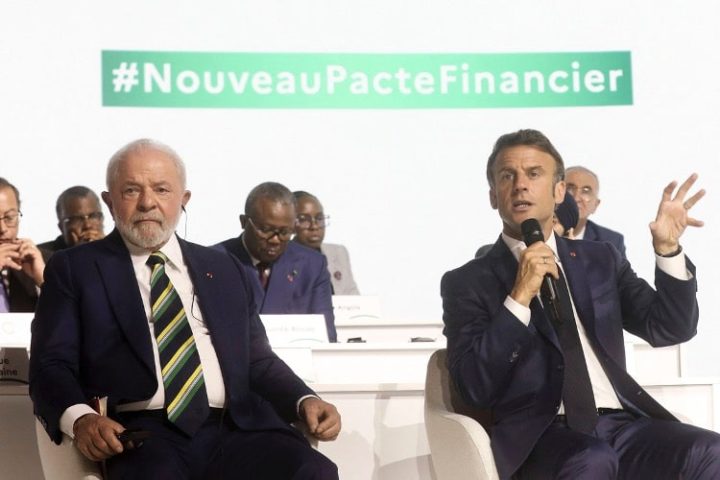
In Paris, the Summit for a New Global Financing Pact has just concluded.
The two-day Paris meeting attracted a host of important globalists and heads of state, including Biden’s climate envoy John Kerry, Treasury Secretary Janet Yellen, French President Emmanuel Macron, German Chancellor Olaf Scholtz, Brazilian president Lula da Silva, European Commission President Ursula von der Leyen, World Bank head Ajay Banga, IMF President Kristalina Georgieva, and UN Secretary-General António Guterres. These and many other globalist movers and shakers headlined the latest in a series of international climate confabs whose purpose is compensating poor countries for alleged climate-related injustices.
According to its official website, the Paris summit had four objectives, namely:
- Restoring fiscal space to countries facing short-term difficulties, especially the most indebted countries
- Promoting private sector development in low-income countries
- Encouraging investment in “green” infrastructure for the energy transition in emerging and developing countries
- Mobilizing innovative financing for countries vulnerable to climate change.
All of these objectives flow from a landmark agreement, reached at the conclusion of last year’s COP 27 UN climate conference in Sharm-al-Sheikh, Egypt, to establish a permanent international fund for “loss and damage payments,” monies to be exacted from wealthy countries and transferred to poor countries in the global South. This unprecedented international transfer of wealth is to be implemented in the name of “climate justice.” In other words, because the climate change allegedly caused by developed countries is adversely affecting the environment and economy in poorer countries, developed countries need to pay for the damage.
The participants at COP 27, including both President Biden and John Kerry, have been promoting the plan effusively. The new global climate campaign premised on the supposed moral obligation of the rich countries to indemnify the poor has come to be known as the “Bridgetown Initiative” after the capital of Barbados, whose energetic prime minister, Mia Mottley, has been the most vocal and persistent proponent of “climate justice.” Mottley was one of the stars at COP 27, and the Bridgeport Initiative was one of the dominant themes at the World Economic Forum’s annual meeting in Davos last January.
The only problem with the whole plan — aside from the fraudulent nature of so-called “climate science” per se — is how to convince the developed countries how to cough up whatever is deemed by globocrats to be their “fair share.”
This is where the seemingly innocuous term “innovative financing” mentioned under the fourth summit objective comes in. Ever since the creation of the entire United Nations system, a key globalist agenda item has been the creation of a global tax, levied and collected worldwide by an international authority. The long-term goal has always been to someday transform the United Nations system into a planetary government superior in authority to all national governments, including superpowers like the United States. But that will not be possible until the United Nations acquires independent revenue streams financed by some kind of global tax.
For decades, economists such as C. Fred Bergsten, former advisor to Henry Kissinger and founding director of the Peterson Institute for International Economics, have been quietly working on ideas for global taxes, including carbon emissions taxes, global sales and income taxes, taxes on international emails, jet fuel taxes on international flights, and so forth. So far, none of these schemes has come to fruition, at least in a global sense.
But now, it turns out that the most likely forms of “innovative financing” for the loss and damage fund are various proposals for a global tax. In a note prepared in anticipation of the June Paris meeting entitled “Financing Loss and Damage: Overview of Tax/Levy Instruments Under Discussion,” authors Mattheiu Wemaëre, Lola Vallejo, and Michel Colombier of the IDDRI, a European think tank promoting the radical climate agenda, laid out several options for an international tax. These include a fossil fuel extraction levy, an air passenger/ticket levy, a tax on “windfall fossil fuel profits,” and an IMO (International Maritime Organization) carbon levy.
Of these proposals, the IMO carbon tax, i.e., a tax levied on all international shipping under the auspices of the IMO, a UN agency that oversees international maritime activities, was received enthusiastically at the Paris conference — so much so that it is now expected to be formalized next month at the IMO’s annual meeting. According to an AP report, “The idea of implementing a tax on the greenhouse gas emissions produced from international shipping has been gaining traction, with possible adoption at a July meeting of the International Maritime Organization. Some experts believe that a tax on shipping alone could raise $100 billion a year, and a strong declaration on this in Paris might provide Macron with a symbolic win, especially if it gets backing from the IMO next month.”
It is hard to overstate the importance of this little-noted development. Giving the United Nations the authority, through the IMO, to levy a global tax for the very first time would be a devastating precedent. What might seem to the casual observer a minor bureaucratic matter with no personal relevance would be enormously consequential, and probably not in the too-distant future. A global tax on shipping would of course trigger a rise in prices, including all those goods from China that Americans have grown so accustomed to buying on the cheap. But far more importantly, it would establish both the framework and the precedent for additional global taxes. And it would for the first time confer on the United Nations system a hefty revenue stream completely independent of the voluntary contributions from member states. Once the IMO carbon tax is up and running, how long will it be before a similar tax is applied to airlines and ticketed passengers? And how long after that before some type of global sales tax is rationalized, all in the name of climate justice? At what point during this process will Americans wake up to the realization that the United Nations system, as a bona fide global taxing authority, has become the true world government that we at The New American, and other like-minded opponents of the UN, have been warning about for decades?
It is very clear that the globalists regard global environmentalism as the most promising pretext for global government. The enaction of a first-ever global tax in the name of “climate justice” would be an enormous step in that direction.



